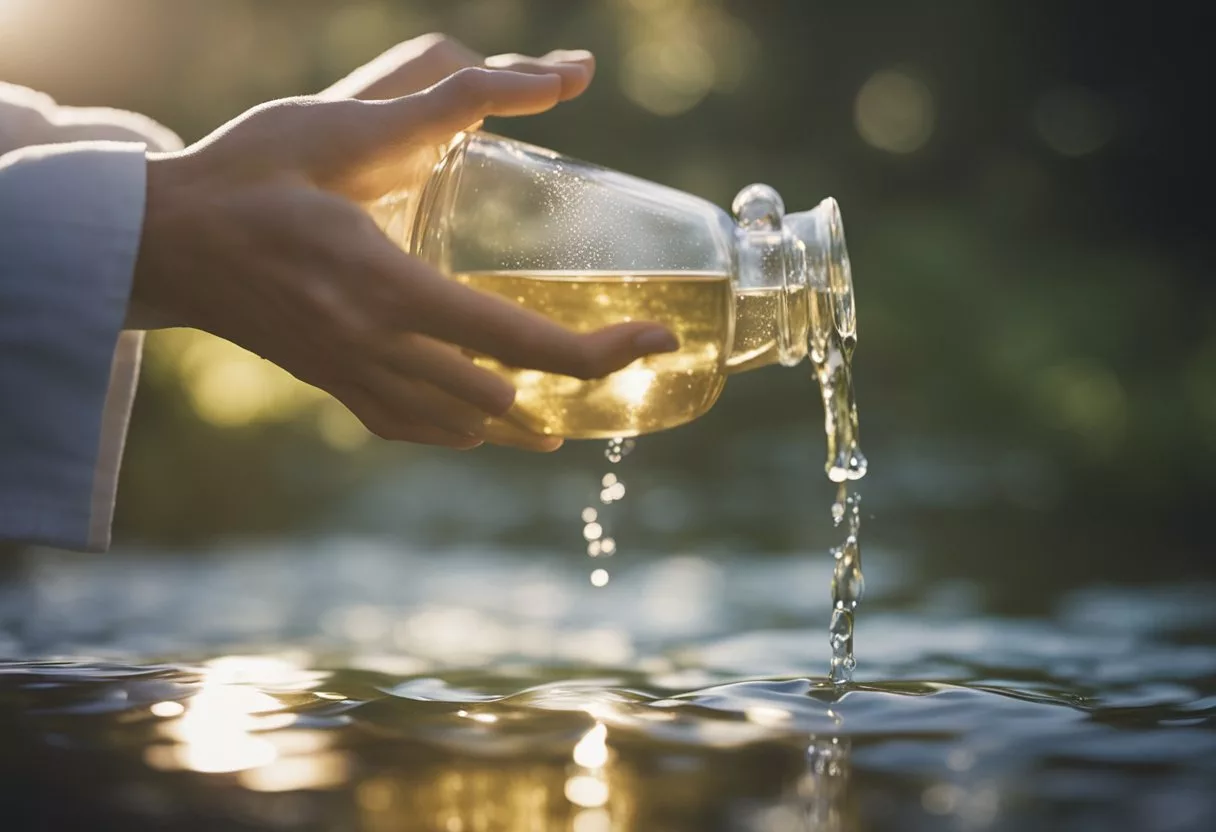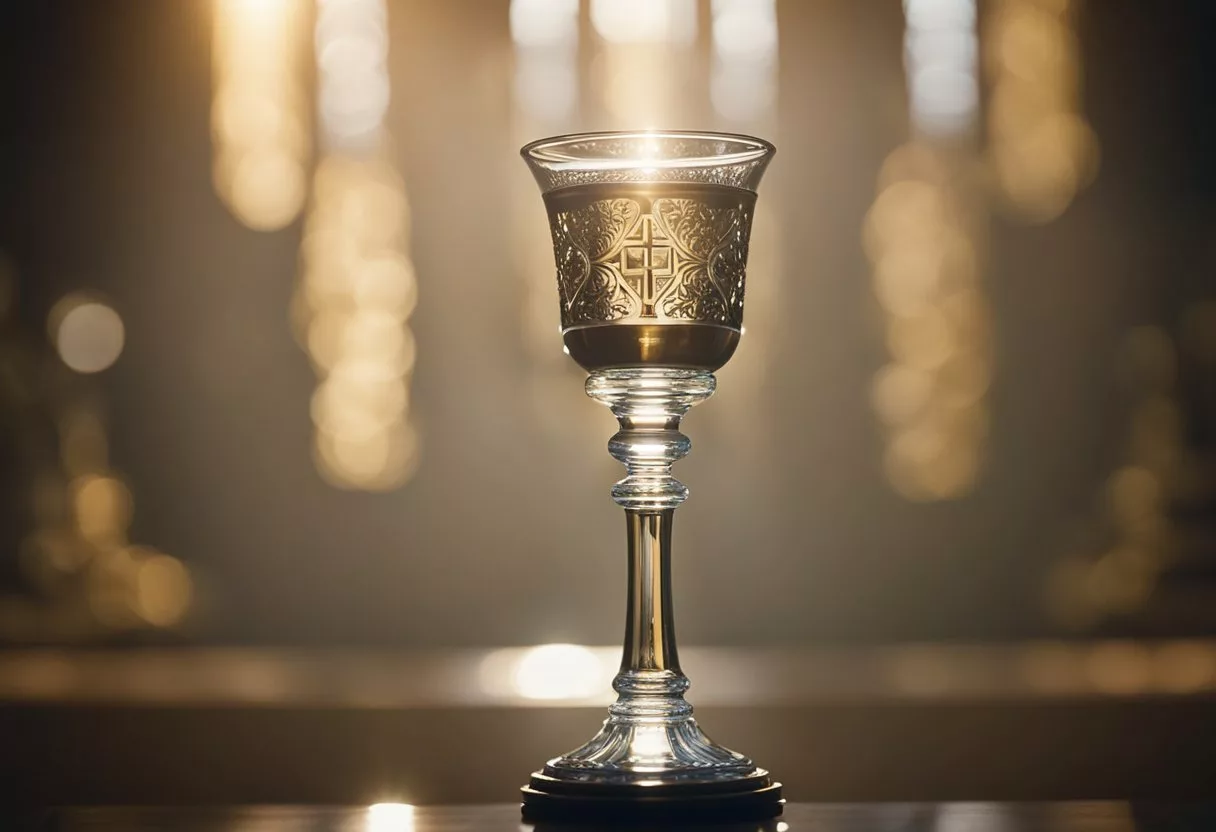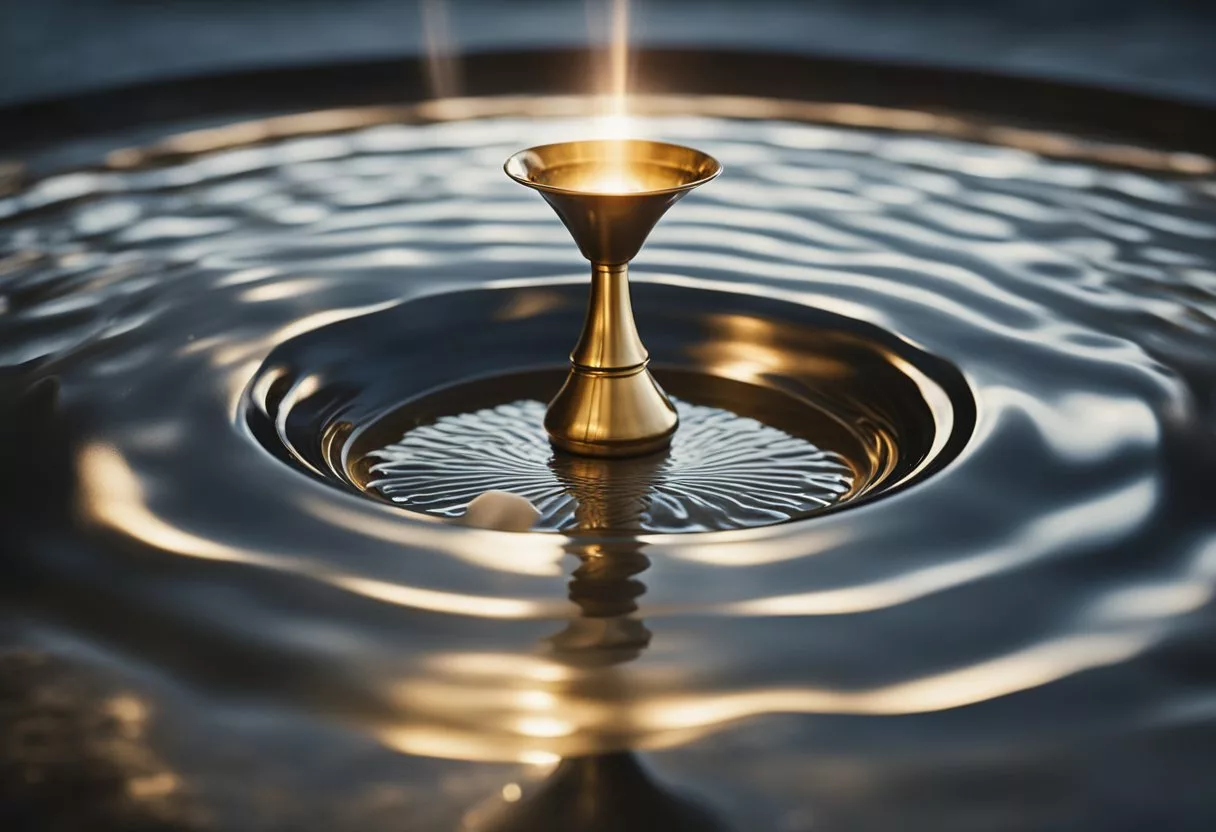Holy water holds special significance in many religious traditions. People often wonder about its effects and potential uses beyond traditional rituals. Some may even consider drinking it for spiritual or health reasons.

Drinking holy water is not a sin, but it’s not recommended for health and safety reasons. Holy water is meant for blessing and spiritual cleansing, not consumption. It may contain harmful bacteria or chemicals from storage containers.
Churches use holy water for blessings and protection. Many believe it brings God’s grace when sprinkled. While drinking it isn’t the usual practice, some faiths do allow small sips during certain ceremonies.
Key Takeaways
- Holy water is for blessing, not drinking
- Consuming holy water may pose health risks
- Holy water plays a vital role in religious rituals and practices
The Nature of Holy Water

Holy water is a sacred element in many religious traditions. It holds spiritual significance and is used in various rituals and ceremonies. The creation and use of holy water involves specific processes and carries deep meaning for believers.
Historical and Religious Context
Holy water has roots in ancient religious practices. The Old Testament mentions purification rituals using water. In Catholicism, holy water is a sacramental – an object blessed by the Church to bring spiritual effects.
The use of holy water spread widely in Christian traditions. It became a symbol of cleansing and blessing. Churches often have holy water fonts at entrances for worshippers to bless themselves.
Holy water plays a role in many religious events. These include baptisms, blessings of people and objects, and exorcisms. Its use aims to bring God’s grace and protection to the faithful.
Preparation and Consecration Process
Making holy water involves specific steps. The process typically requires a priest to bless regular water. Some traditions also add salt to the water before blessing it.
The blessing ritual includes prayers and sometimes exorcism formulas. These are meant to cleanse the water and imbue it with spiritual power.
Key steps in holy water preparation:
- Gathering clean water
- Adding salt (in some cases)
- Reciting specific prayers
- Performing blessing gestures
The Catholic Church has official liturgies for blessing holy water. These can vary for different purposes or occasions. Once blessed, the water is considered holy and ready for religious use.
Spiritual Significance

Holy water holds deep meaning in Christianity. It connects believers to God’s grace and blessing through sacred rituals and personal use.
Symbolism in Christianity
Holy water symbolizes purification and God’s blessing. When Catholics make the sign of the cross with holy water, they recall their baptism. This act reminds them of God’s forgiveness and cleansing from sin.
The water represents the Holy Spirit’s presence. It serves as a physical sign of divine grace. Many believe holy water offers spiritual protection. Some use it to bless homes, objects, or themselves.
Holy water links the physical and spiritual worlds. It turns an everyday element into something sacred through the Church’s blessing.
Use in Baptism and Other Sacraments
Baptism is the primary sacrament using holy water. It washes away original sin and welcomes new members into the Church. The water symbolizes cleansing and rebirth in Christ.
Priests use holy water in other rituals too. They sprinkle it during Mass to bless the congregation. It’s part of dedications for new buildings or objects.
Holy water plays a role in exorcisms and healing prayers. The Church sees it as a tool for spiritual warfare and divine intervention.
Catholics often keep holy water at home for personal use. They may bless themselves or family members with it daily.
Theological Understanding

Holy water holds deep spiritual significance in Catholic tradition. It serves as a powerful symbol of God’s grace and protection for the faithful.
Grace and Purification
Holy water is seen as a channel of divine grace. Catholics believe it cleanses and purifies the soul. When used with faith, it can wash away venial sins and strengthen one’s spiritual resolve.
The Catechism of the Catholic Church teaches that sacramentals like holy water prepare people to receive God’s grace. It reminds believers of their baptism and renewal in Christ.
Holy water is often used in blessings and prayers. Catholics may sprinkle it on objects or themselves as an act of faith. This practice is meant to invite God’s presence and purifying power into their lives.
Protection from Evil
Catholics view holy water as a shield against evil forces. It is believed to offer spiritual protection and ward off demonic influences.
Many Catholics keep holy water in their homes. They may bless themselves with it daily or use it to bless their living spaces. This act is seen as a way to create a sacred environment and invoke God’s protection.
In exorcisms, holy water plays a key role. Priests use it as a powerful tool against evil spirits. The faith holds that evil cannot withstand the purifying power of this blessed water.
Holy water’s protective qualities extend beyond spiritual realms. Some Catholics believe it can also bring physical healing[1] when used with prayer and faith.
Practices Involving Holy Water

Holy water plays a key role in Catholic traditions. It is used for personal blessings and in church ceremonies.
Personal Use for Blessing
Catholics often keep holy water in their homes. They use it to bless themselves, family members, and objects. Many sprinkle holy water for protection against evil.
Some people make the sign of the cross with holy water when entering their home. This act is believed to bring God’s grace and safeguard the dwelling.
Catholics may also bless their cars, pets, or new items with holy water. This practice seeks divine protection for everyday life.
Use in Church Ceremonies
In Catholic churches, holy water fonts are placed near entrances. Worshippers dip their fingers and make the sign of the cross when entering.
Priests use holy water in many religious ceremonies[2]. During baptisms, they pour or sprinkle it on the person being baptized.
Holy water is used to bless people, objects, and spaces in the church. It’s part of dedication ceremonies for new buildings or items used in worship.
During some Masses, the priest may sprinkle holy water on the congregation. This act reminds people of their baptism and God’s blessings.
Health, Healing, and Holy Water

Holy water has long been linked to health and healing in religious traditions. Many believe it has special powers to cleanse both body and soul.
Historical Beliefs and Practices
In the past, people drank holy water to cure illnesses. They thought it could heal diseases[3] and cleanse the body of sin. Some used it to bless the sick or injured.
Holy water was seen as a way to protect against evil spirits. People sprinkled it in homes and on farm animals. They believed it could ward off plagues and natural disasters.
Churches kept holy water fonts for people to use. Pilgrims traveled far to collect water from sacred springs. They took it home to use as medicine.
Modern Perspectives
Today, views on holy water’s healing powers are mixed. Some still see it as blessed and able to promote wellness. Others view it more as a symbol of faith.
Doctors warn that drinking holy water can spread bacteria. Many fonts contain germs from many hands dipping in. This can make people sick instead of healing them.
Some use holy water for non-medical purposes:
- Blessing homes
- Cleansing objects
- Spiritual rituals
While not proven to cure disease, holy water remains important in many faiths. It serves as a reminder of God’s grace for believers.
Cultural and Community Aspects

Holy water plays a key role in religious practices across different Christian denominations. It brings people together in shared traditions and community events.
Traditions among Different Denominations
Catholics use holy water most widely. Catholic priests bless water to make it holy. People dip their fingers in it when entering churches. They make the sign of the cross as a reminder of baptism. Some Catholics keep holy water at home for blessings.
Orthodox Christians also use holy water. They drink small amounts on special days. Priests bless homes with it yearly.
Many Protestant churches don’t use holy water. But some do for baptisms.
Pilgrims often collect holy water from sacred sites. They believe it has special powers.
Community Gatherings and Holy Water
Holy water brings church communities together. At Easter, priests bless large amounts of water. People take it home to use all year.
Some churches hold healing services with holy water. People pray for God’s mercy and renewal.
Feast days may include sprinkling holy water on crowds. This act unites people in their belief in God.
Holy water on church altars reminds visitors of religious traditions. It creates a shared experience for the community.
Holy Water in the Home

Holy water plays a significant role in many homes. It serves as a reminder of baptism and offers protection and blessings for families.
Use and Storage
Many families keep holy water fonts[4] near the entrance of their homes. These small containers allow family members to bless themselves when entering or leaving.
Some people store holy water in small bottles. They keep these in bedrooms or other areas for easy access.
Holy water can be used to bless objects in the home. This includes new furniture, religious items, or even vehicles.
Parents may use holy water to bless their children before bed or during times of illness. This practice brings comfort and a sense of divine protection.
It’s important to store holy water properly. Keep it in clean, sealed containers to prevent contamination.
Protection and Blessing the Home
Holy water is believed to offer spiritual protection for the home and its inhabitants. Many families sprinkle it in each room during house blessings.
Some people use holy water to make the sign of the cross on doorways and windows. This is thought to create a barrier against negative influences.
During times of stress or conflict, families may pray together while using holy water. This can bring a sense of peace and unity.
Holy water can be used to bless new homes or after major renovations. This practice dedicates the space to God and invites His presence.
Regular use of holy water in the home serves as a physical reminder of faith. It encourages family members to focus on their spiritual lives.
Disposal and Respect

Holy water is a sacred item that requires careful handling and disposal. Proper methods ensure respect for its blessed nature while protecting the environment.
Proper Disposal Methods
Holy water should never be poured down a drain. The recommended way to dispose of holy water is to pour it directly onto the ground. This allows it to return to the earth naturally.
Many Catholic churches have a special basin called a Sacrarium. This basin connects to a pipe leading to the ground. It’s designed for the proper disposal of holy water.
At home, you can pour holy water onto soil or plants. This is a respectful way to dispose of it while nourishing plant life.
If the container holding holy water is blessed, it needs special treatment too. Clean it thoroughly with regular water before disposal or reuse.
The Significance of Respectful Handling
Treating holy water with respect reflects its sacred nature. It’s not just clean water, but a blessed sacrament used for purification and blessings.
Holy water reminds believers of their baptism and God’s grace. Handling it carefully shows reverence for its spiritual significance.
Proper disposal also protects the environment. It prevents blessed water from mixing with waste or polluted water systems.
Respectful handling extends to the containers used for holy water. These should be kept clean and used only for this purpose. This maintains the purity and sanctity of the holy water they hold.
Common Misconceptions
People often have wrong ideas about holy water. These misunderstandings can lead to confusion about its purpose and effects.
Magical vs. Sacramental Understanding
Some think holy water has magical powers. This is not true. Holy water is a sacramental, not a magic potion. It’s a symbol of God’s grace, not a cure-all.
Holy water can’t ward off evil spirits on its own. It’s not meant to protect against the devil or temptations automatically. Its power comes from faith and the blessings of the Church.
Many believe drinking holy water will bring instant blessings. This view misses the point. Holy water is meant to remind us of baptism and God’s love.
Misinterpretation of Effects
Some think drinking holy water will make them sick. This isn’t always true. Clean holy water is just blessed regular water. It’s safe if it comes from a clean source.
Others believe holy water will solve all their problems. This is not correct. Holy water is a tool for prayer and reflection. It doesn’t work like medicine.
There’s also a myth that holy water burns evil people. This is false. Holy water doesn’t harm anyone physically. Its effects are spiritual, not physical.
Conclusion

Drinking holy water is not inherently harmful or sinful. Many Christians use it as part of their spiritual practices.
The Eastern Orthodox drink holy water[5] as part of their traditions. Catholics often use it for blessings and protection.
Holy water serves as a reminder of baptism[6] and God’s grace. It can be a meaningful part of Christian life and reflection.
Safety depends on the water source. Clean holy water from churches is usually safe to consume in small amounts.
Keeping holy water at home[7] for personal use is common for many Catholics. They may use it for prayers or blessings.
Ultimately, the spiritual significance of holy water matters most. It represents God’s blessings and cleansing power for believers.
Those interested in using holy water should consult their religious leaders. They can provide guidance on proper use within their faith tradition.
Frequently Asked Questions

Holy water sparks curiosity and raises many questions. People wonder about its safety, benefits, and religious significance. Let’s explore some common queries about drinking holy water.
Is it safe to consume holy water?
Drinking holy water can pose health risks. Studies show that up to 86% of holy water samples contain fecal bacteria[8]. This contamination makes it unsafe for consumption.
Church fonts and springs often have high bacteria levels. It’s best to avoid drinking holy water to prevent illness.
What are the potential benefits of drinking holy water?
Some believe holy water has spiritual benefits. They think it can purify the soul and bring blessings.
However, there’s no scientific evidence to support these claims. The main purpose of holy water is for blessings and religious rituals[5], not consumption.
Are there any religious guidelines or restrictions when it comes to drinking holy water?
Most religions don’t encourage drinking holy water. It’s meant for external use in rituals and blessings.
Catholics, for example, use holy water for baptisms and other sacraments[6]. They don’t typically drink it.
What is the composition of holy water and does it differ by denomination?
Holy water is usually regular water blessed by a religious leader. In most cases, it doesn’t contain special ingredients.
Some churches might add salt to the water before blessing it. The blessing process is what makes it holy, not the composition.
Why is holy water considered powerful or sacred within various religious traditions?
Holy water holds symbolic meaning in many faiths. It represents purification and God’s blessing[7].
In Christianity, holy water recalls baptism and spiritual cleansing. Other religions use it for similar symbolic purposes.
Does drinking holy water play a role in spiritual healing or rituals?
Drinking holy water isn’t a common practice in most spiritual healing rituals. Instead, it’s often sprinkled or used for blessings.
Some people might drink it believing in its healing power. But this isn’t a widely accepted or recommended practice in most faiths.
References
- The Effects of Holy Water. https://catholicexchange.com/effects-holy-water/ Accessed October 21, 2025
- Living Liturgically: Using Holy Water in Your Devotional Life. https://www.catholiccompany.com/magazine/living-liturgically-using-holy-water-in-your-devotional-life/ Accessed October 21, 2025
- Holy Water Benefits: 6 Facts You Need To Know — Catholics & Bible. https://catholicsbible.com/holy-water-benefits/ Accessed October 21, 2025
- Making, Using, and Blessing with Holy Water at Home: A Guide. https://christianpure.com/learn/holy-water-home-making-using-blessing/ Accessed October 21, 2025
- 429 Too Many Requests. https://christianfaithguide.com/what-happens-if-you-drink-holy-water/ Accessed October 21, 2025
- What Happens If You Drink Holy Water? — Catholics & Bible. https://catholicsbible.com/what-happens-if-you-drink-holy-water/ Accessed October 21, 2025
- Why Do Catholics Use Holy Water and Its Significance?. https://www.catholicshare.com/why-catholics-use-holy-water-and-its-significance/ Accessed October 21, 2025
- Is It A Sin to Drink Holy Water?. https://laycistercians.com/what-happens-if-you-drink-holy-water/ Accessed October 21, 2025
